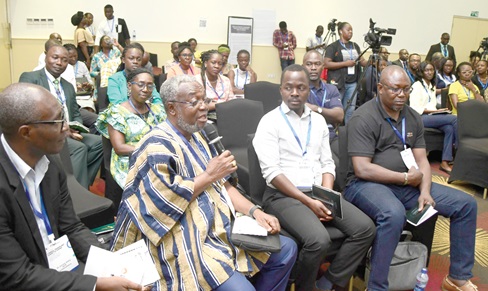
Expedite action on Human Organ and Tissue Donation Bill — Stakeholders
Stakeholders in eye health have called on the government to accelerate the passage of the Human Organ and Tissue Donation Bill, 2023, into law to improve on healthcare.
They said the absence of a law to regulate and facilitate cornea donation was preventing more than 26,000 citizens living with corneal blindness from regaining their sight through transplant.
The stakeholders included the Ophthalmological Society of Ghana (OSG), the Ghana Health Service (GHS), the Ghana Medical Association and NGOs in health.
They made the call at the second corneal transplant summit in Accra on Monday.
Cureblindness (HCP) co-hosted the summit with OSG, in partnership with the GHS on the theme: "Eliminating corneal blindness in Ghana: The time is now for the human organ and tissue law.”
Participants included senior consultants and surgeons in the field of ophthalmology such as Dr Seth Lartet, Dr Edith Dogbe and Dr Dziffa-Bella Ofori-Adjei.
Replacement
Ghana Country Director of HCP, Dr James Addy, said replacing a damaged cornea with a donated one salvaged from a dead person within six hours of death, or a donation by a dying person legally, was the only way to reverse corneal blindness.
“Corneal blindness is easily repairable through transplant surgery based on the availability of healthy tissues.
“In 2022, the country’s only four corneal surgeons performed 14 sight-saving surgeries commemorating a significant milestone in the field of ophthalmology in the country.
“At present, the surgeons are dependent on tissues sourced from abroad which is both costly and time-consuming.
The medical fraternity earnestly requests the government to pass the bill which would help establish eye banks,” he said.
Dr Addy, however, said the proposed legislation was not limited to corneas but all organ donations and transplants needed as the only option to restore the health of people suffering from some health conditions.
He said the bill as it was now, provided strict guidelines for donation, adding that stringent and deterring punishments had been provided in the bill to prevent potential offenders from violating the law.
Situation
The Presidential Advisor on Health, Dr Anthony Nsiah-Asare, said corneal blindness was a silent epidemic currently affecting over 26,000 citizens, representing 11.2 per cent of the total burden of blindness in the country.
He said the bill was currently being worked on by various stakeholders.
The Head of Eye Unit of the GHS, Dr Hornametor Afake, said corneal blindness affected the most productive age of the population.
Writer’s email:
